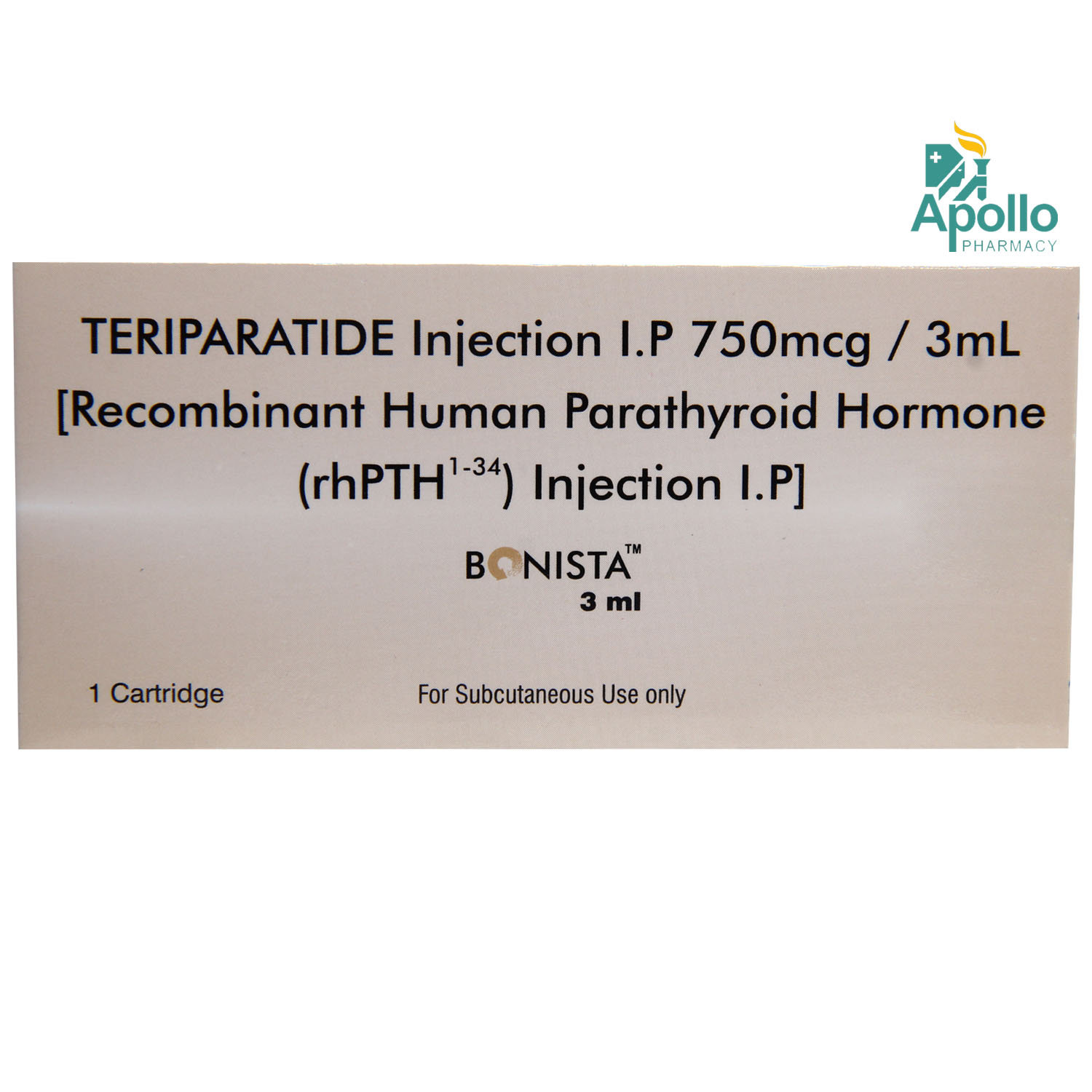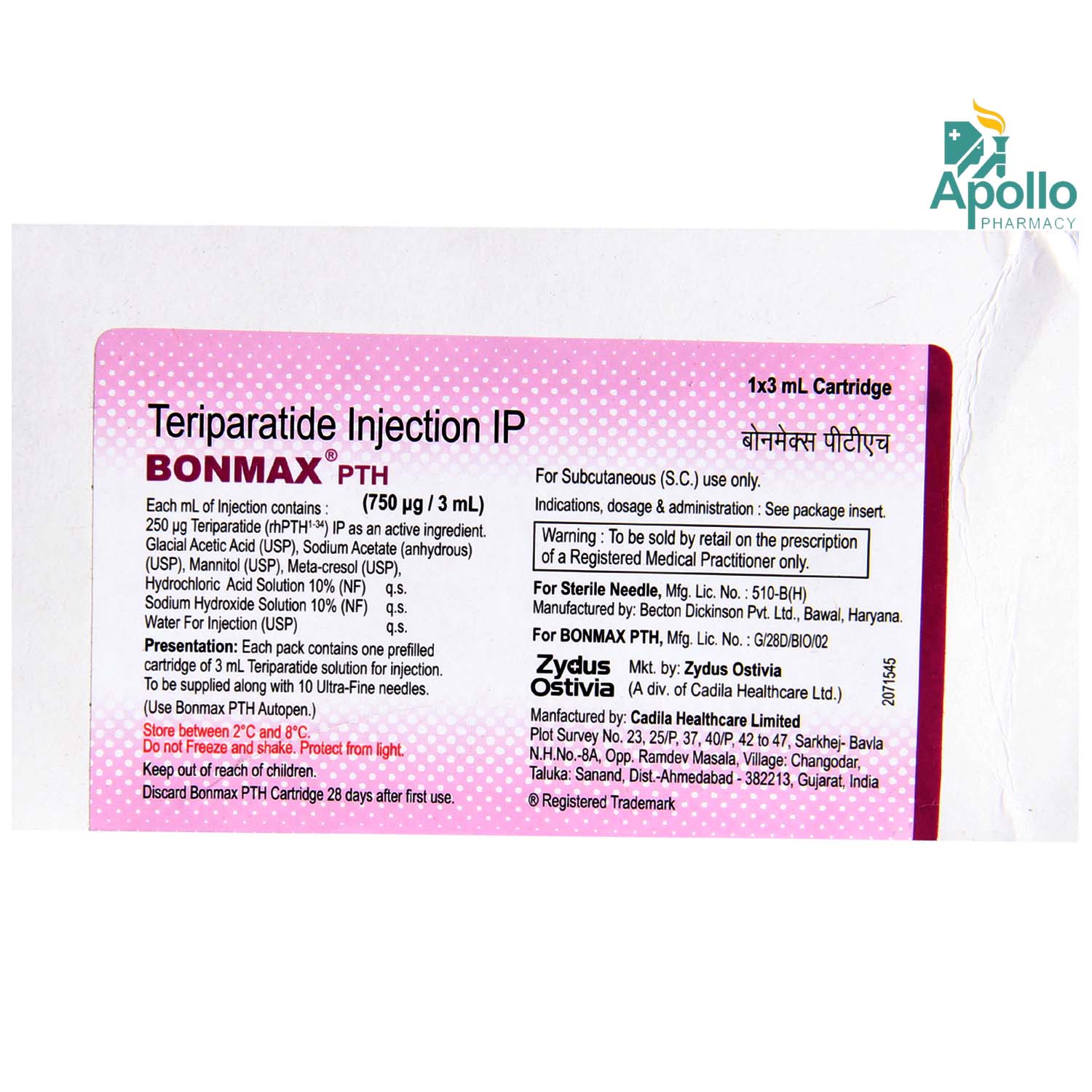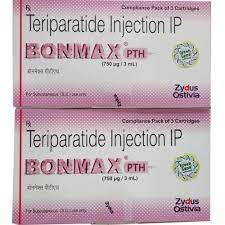Teriparatide
About Teriparatide
Teriparatide belongs to the class of medication called 'anabolic (promoting bone formation) agent' indicated for prevention and treatment of osteoporosis in adults and helps to strengthen the bone. This medicine also helps to reduce the risk of spine and hip fractures. Osteoporosis is a medical condition in which bone becomes thin or weak. The chance of developing osteoporosis increases with age, after menopause or by taking corticosteroid medications (such as prednisone) for a long period. If proper treatment is not provided then it can even result in broken bones.
Teriparatide contains Teriparatide a synthetic form of the human parathyroid hormone, which helps to regulate calcium metabolism. Teriparatide works by causing the body to build new bone by increasing bone strength and bone mass density (BMD) (thickness) and reduce the risk of fractures by stimulating bone formation. It also increases the thickness of bone and rebuilds bones which reduces the risk of spine and hip fractures.
Teriparatide will be administered by a healthcare professional; do not self-administer. In some cases, Teriparatide can cause side effects like nausea, vomiting, joint pain, leg cramps, swelling/redness at the injection site, upset stomach, diarrhea, constipation, runny nose, cough, and throat irritation. Most of these side effects of Teriparatide do not require medical attention and gradually resolve over time. However, if these side effects persist longer, please consult your doctor.
To treat your condition effectually, continue taking Teriparatide for as long as your doctor has prescribed. Consult your doctor before taking Teriparatide if you are pregnant or breastfeeding; your doctor will prescribe you Teriparatide only if the benefits outweigh the risks. Teriparatide is not recommended for children below 18 years of age. Tell your doctor that you are taking Teriparatide before you have any lab test as this medicine could interfere with the results. Teriparatide may cause dizziness, lightheadedness, and fainting when you get up too quickly from a lying position. To avoid this problem, get out of bed slowly, resting your feet on the floor for a few minutes before standing up. Inform your doctor about your health condition and medications before taking Teriparatide to rule out any side effects. Teriparatide is a cold chain medicine, and so it has to be stored in the refrigerator between 2-8 degrees Celsius else its efficiency might be lost. Do not store in the freezer or the fridge.
Uses of Teriparatide
Medicinal Benefits
Teriparatide is a synthetic form of a natural human hormone called parathyroid hormone (PTH) that is prescribed to prevent and treat osteoporosis in persons with weak bones. It prevents the loss of bones that happens after menopause and helps to rebuild bones. Teriparatide contains Teriparatide which works by causing the body to build new bone and by increasing bone strength and bone mass density (BMD) (thickness) and reduce the risk of fractures by stimulating bone formation. It also increases the thickness of bone and rebuilds bones which reduces the risk of spine and hip fractures. Teriparatide is also indicated for the treatment of increasing bone mass in people with osteoporosis, glucocorticoid-induced osteoporosis.
Directions for Use
- Use Teriparatide as directed by your doctor or as per the labelled instructions.
- It is recommended to administer Teriparatide once daily at the same time each day or as advised by your doctor.
- Teriparatide should be administered subcutaneously (under the skin) into the abdomen or thigh.
- Change the injection site each time to prevent the formation of hard lumps.
Storage
Side Effects of Teriparatide
- Nausea
- Vomiting
- Joint pain,
- Leg cramps
- Swelling/redness at the injection site
- Feeling dizzy, tired, or weak
- Upset stomach
- Diarrhea
- Constipation
- Runny nose
- Cough
- Throat irritation
Drug Warnings
Teriparatide is not recommended if you have hypercalcemia (high calcium levels) or an overactive parathyroid gland, metastatic calcification (extra deposits of calcium in the body) and malabsorption syndrome (difficulty absorbing nutrition from food), kidney stones, kidney problems (moderate renal impairment), Paget’s disease of bone (abnormal bone changes), history of skeletal malignancies. It is important that your doctor check your progress regularly to make sure that Teriparatide is working properly. Blood and urine tests may be needed to check for unwanted effects. Teriparatide can increase the amount of calcium in your blood or urine. Talk to your doctor before or while using Teriparatide if you have continuing nausea, vomiting, constipation, low energy or muscle weakness. These may be signs there is too much calcium in your blood. Consult your doctor before taking Teriparatide if you are pregnant or breastfeeding; your doctor will prescribe you Teriparatide only if the benefits outweigh the risks. Teriparatide should not be given to children as safety and efficacy have not been established. Do not take Teriparatide for longer durations unless prescribed by your doctor. If your condition does not improve even after taking the Teriparatide full course, please consult your doctor. Teriparatide may increase the risk of having cancer while taking longer durations. Talk to your doctor if you have concerns about this risk. Avoid consuming alcohol along with Teriparatide as it could lead to increased drowsiness. Inform your doctor about your health condition and medications before taking Teriparatide to rule out any side effects.
Drug Interactions
Drug-Drug interaction: Teriparatide may interact with a medicine used to treat heart disease (digoxin, digitalis), medication is used to treat psoriasis (calcitriol topical, calcipotriene topical), water pills (furosemide, hydrochlorothiazide).
Drug-Food interaction: No interaction found.
Drug-Disease interaction: Teriparatide is not allowed to use in some patients dealing with hyperparathyroidism, malignancy (cancer), metabolic bone disorder, orthostatic hypotension (low blood pressure when standing up from sitting or lying down), renal impairment, urolithiasis (stone formation in the bladder or urinary tract).
Drug-Drug Interactions Checker List:
Safety Advice

Alcohol
unsafeYou are recommended to avoid alcohol consumption while taking Teriparatide. Alcohol intake, along with Teriparatide, may cause increased drowsiness.

Pregnancy
cautionIt is advised not to take Teriparatide if you are pregnant unless prescribed by the doctor as Teriparatide is a pregnancy category C drug. Your doctor will prescribe Teriparatide only if the benefits outweigh the risks.

Breast Feeding
cautionIt isn’t known if Teriparatide passes into breast milk. If it does, it may cause side effects in a child who is breastfed. Talk to your doctor if you breastfeed your child.

Driving
cautionIt may cause dizziness, fatigue and blurring of vision; do not drive or operate heavy machinery if you feel drowsy.

Liver
cautionDose adjustment may be needed. Teriparatide should be used with caution in patients with liver impairment/liver disease. Please consult your doctor if you have a liver impairment or any concerns regarding this.

Kidney
cautionTell your doctor if you have kidney disorders as after checking the health condition, a doctor will decide that this medicine is safe to prescribe or not.

Children
cautionTeriparatide should not be given to children or adolescents whose age is less than 18 years. Safety and effectiveness have not been established.
Habit Forming
Diet & Lifestyle Advise
- A person should consume calcium and vitamin D in their diet as it helps make stronger bones and avoid everyday osteoporosis dangers.
- A post-menopausal woman should limit salt intake as it can pose a high risk of losing more bone minerals than other women of the same age.
- Do regular exercise like weight-bearing exercises which are important for maintaining bone health.
- Calcium is important for making bones strong. Vitamin D is equally important, which helps to ensure the absorption and retention of calcium in bones, so take food high in calcium and vitamins.
Special Advise
- Certain diagnostic test like blood test measures the level of calcitonin in your blood and bone density scan is used to check bone mineral density (BMD).
- Teriparatide should not be prescribed for patients at increased baseline risk of osteosarcoma (bone cancer).
- Clinical monitoring of urine tests or serum electrolyte concentrations is recommended.
- Do not take Teriparatide for longer durations unless prescribed by your doctor.
Patients Concern
Disease/Condition Glossary
Osteoporosis: It is a medical condition that causes thinning and weakening of the bones. The chance of developing osteoporosis increases with age, after menopause or by taking corticosteroid medications (such as prednisone) for a long period. If proper treatment is not provided then it can even result in broken bones. In starting days, osteoporosis does not show any symptoms. However, if proper treatment is not provided then it can even lead to broken bones. In Osteoporosis, bones can break at any time even during daily activities like lifting or even from minor activities. Fractures usually occur at the hip, spine or wrist which can even lead to stooped posture (‘dowager’s hump’) and loss of movement.
FAQs
Teriparatide is used to treat osteoporosis (weak and brittle bones).
Teriparatide contains Teriparatide is a synthetic form of a natural human hormone called parathyroid hormone (PTH). It works by increasing the number and activity of bone-forming cells (osteoblasts). This strengthens the bones and minimizes the risk of fractures.
Teriparatide can cause kidney stones due to excess calcium deposition when used for a prolonged period. Please consult your doctor before taking Teriparatide as a daily supplement if you have any kidney problems or a history of kidney stones.
Persons whose age is more than 35 years have low estrogen levels, female reaching menopause, too much consumption of alcohol, tobacco, or caffeine, use of glucocorticoid and lack of calcium and vitamin D in the foods are some of the factors that can increase the risk of osteoporosis.
Teriparatide is a part of a complete program that includes modifications in diet, regular exercise, bone mineral density testing and intake of calcium and vitamin supplements. Follow all the guidelines given by the doctor very closely.
Yes, Teriparatide may increase serum calcium, urinary calcium, and serum uric acid. Inform the person doing the tests that you are taking Teriparatide.
You are not recommended to stop taking Teriparatide without consulting your doctor, as stopping early might affect the treatment's effectiveness. Always follow your doctor’s instructions.
Osteoporosis is a condition that causes bones to become thin and weak. The risk of developing it grows with age, after menopause, or from long-term use of corticosteroid medications like prednisone.
Teriparatide is not a steroid, it belongs to a class of medications called anabolic (promoting bone formation) agent.
You are advised to take Teriparatide for as long as prescribed by a doctor to treat your condition effectively. Prolonged or long-term use of Teriparatide increases the risk of cancer. Therefore, follow your doctor’s instructions and do not self-medicate.
Store Teriparatide in a sterile, airtight tamper-proof container at a temperature of 2°C -8°C. Do not freeze.
Teriparatide is not advised to use in some patients dealing with hyperparathyroidism, malignancy (cancer), metabolic bone disorder, or orthostatic hypotension (low blood pressure when standing up from sitting or lying down), renal impairment, urolithiasis (stone formation in the bladder or urinary tract). However, please consult a doctor if you have any concerns.
You are recommended to inform your doctor about any other medications, or supplements, you are using before starting Teriparatide. This ensures potential interactions or side effects are avoided. Always follow your doctor’s guidance when combining treatments.
Teriparatide is not recommended during pregnancy unless advised by a doctor, as there is no sufficient data on its safety for the mother or baby. If pregnancy is detected, consult your doctor immediately to evaluate the risks and discontinue use if necessary.
Teriparatide has side effects such as nausea, joint pain, vomiting, leg cramps, swelling, upset stomach, diarrhoea, constipation, running nose, cough, and throat infection. These are temporary and do not require any medical treatment as they gradually reduce over time. Please, consult a doctor if these side effects persist.
Avoid using Teriparatide if you have conditions like hypercalcemia, kidney stones, or Paget’s disease (abnormal bone growth). Regular blood and urine tests are essential to monitor calcium levels. Avoid use during pregnancy, breastfeeding, or in children unless advised by a physician. Alcohol should be avoided to prevent excessive drowsiness. Always inform your doctor your medical history and medications you are taking.





